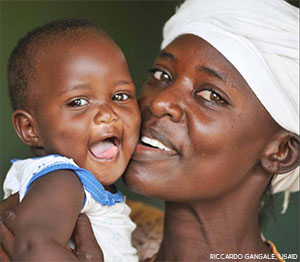 In May 2014, USAID released the 2014–2025 Multi-Sectoral Nutrition Strategy, marking the first time the agency has had an overarching strategy that emphasizes the need to address both direct and underlying causes of malnutrition in order to have an impact on the problem. The strategy also provides a blueprint for alignment of the efforts of the USAID Bureau of Global Health, the U.S. Government’s Feed the Future and Global Health initiatives, the Office of Food for Peace development programs, resilience efforts, and other nutrition investments.
In May 2014, USAID released the 2014–2025 Multi-Sectoral Nutrition Strategy, marking the first time the agency has had an overarching strategy that emphasizes the need to address both direct and underlying causes of malnutrition in order to have an impact on the problem. The strategy also provides a blueprint for alignment of the efforts of the USAID Bureau of Global Health, the U.S. Government’s Feed the Future and Global Health initiatives, the Office of Food for Peace development programs, resilience efforts, and other nutrition investments.
As part of the next phase for the new strategy, USAID is supporting its rollout and implementation through the release of a series of technical guidance briefs and a series of Multi-Sectoral Nutrition Global Learning & Evidence Exchanges (MSN-GLEEs). The fourth and final MSN-GLEE was held in Washington, DC, on July 15, 2016 and was attended by USAID Mission staff and other U.S. Government staff, host country government partners, implementing partners, and other experts working in this area.
Presentations
The contents of the presentations are the responsibility of the individual authors and do not necessarily reflect the views of USAID or the United States Government.
- Overview of Goals and Objectives of the Meeting
Sandy Remancus, FANTA - Multi-Sectoral Nutrition Strategy 2014-2025
Anne Peniston, Nutrition Division Chief, USAID Bureau for Global Health - Review of the Evidence: Nutrition-Specific Actions
Sandy Remancus, FANTA - Review of the Evidence: Nutrition-Sensitive Programming
Heather Danton, SPRING - Position of Dietary Diversity on Public Health Nutrition and Potential Interventions
Omar Dary, USAID/GH - Dietary Diversity for Human Development and Health
Monica Woldt, FANTA - Water, Sanitation, and Hygiene (WASH) Interventions for Improved Nutrition
Liz Jordan, USAID/GH - Climate Smart Agriculture and Nutrition
Mark Visocky, USAID/BFS - Achieving Results in Multi-Sectoral Food and Nutrition Security Projects – Evidence from Bangladesh
Arif Rashid, USAID/DCHA/FFP - Sustaining Development: Results from a Study of Sustainability and Exit Strategies among FFP projects
Laura Glaeser, FANTA - Aflatoxin Impacts on Child Growth
Ahmed Kablan, USAID/BFS and Katherine Dennison, USAID/BFS - Decentralized Health Care and Nutrition: Lessons from Honduras
David Castellanos, USAID/Honduras - Applying USAID’s Multi-Sectoral Nutrition Strategy: Coordination and Collaboration Across Three Countries
Carolyn Hart, SPRING - Multi-Sectoral Approach in Nutrition - Haiti
Olbeg Desinor, USAID/Haiti - Coordination of Multi-Sectoral Nutrition Programming: Lessons from Rwanda
Silver Karumba, USAID/Rwanda - Health and Food Security Collaboration
Sopheanarith Sek, USAID/Cambodia - Improving Coordination with Government of Honduras Entities
David Castellanos, USAID/Honduras


